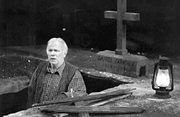A FRIEND OF MINE who had lived in Ireland for several years as a young man finally convinced his wife to accompany him on a return trip. While he loved revisiting the country, she was less enthusiastic. “She couldn’t stand the oppressive feel of the history,” he told me. “All those graveyards with the coffins buried in layers on top of each other. The past is always just around the corner over there, still going on.”
A SKULL IN CONNEMARA
A Contemporary Theater, ends August 20
At least one Irishman shares this point of view, and that’s playwright Martin McDonagh. In his widely successful The Beauty Queen of Lenane (staged at the Rep last year), he personified Ireland herself—in all her selfish, dreary neediness—in the monstrous figure of Mag, who destroys her daughter’s one chance of escape from her deadening life. Now, in the American premiere of his 1997 play A Skull in Connemara, the weight of history and the refusal of the dead to stay buried are both metaphorical and literal. In the politics of Northern Ireland, this is a recurring tragedy. But for McDonagh the result is deliriously, though darkly, comic.
In contemporary Connemara, a small town near Galway, we meet the laborer Mick Dowd (Kevin Tighe, with a wonderful weary strength that seems infused with granite dust). He’s hired by the local church each autumn to dig up a portion of the graveyard and clear the way for new arrivals. This year, however, there are two innovations to the plan. The first is that he’s been given an assistant, a high-spirited troublemaker named Mairtin (Andrew McGinn), who, as another character says, “is thick as five thick fellas.” The second is that he’s to dig up a corner of the graveyard containing the body of his wife, killed seven years previous by his own drunk driving.
Rumors of foul play have circulated ever since, and when Mick gets to her exhumation, it’s to be under the eye of local policeman Thomas (Christopher Evan Welch), who makes it clear that he’s got his suspicions. But despite Thomas’ oft-repeated desires to be a detective (“You know, like Quincy”), thus far his efforts at forensic detection—such as musing why an obese man who died of a heart attack had a nearly empty fridge—have been laughed off by his superiors.
ANY ATTEMPT to discover the truth, whether of a suspicious death or the current motives of anyone at all, is clearly going to be difficult. Brutish cruelty and deception are the norm in McDonagh’s world. Mairtin’s description of baking a hamster alive in an oven is played off as a school- boy prank, and even his grandmother Maryjohnny (Joaunne LeRoy), who constantly berates him for swearing, cheats at church bingo and runs a tourist stand where she rips off American visitors. Everyone has a set of personal sins, and—in such a small town— everyone has plenty of gossip about everyone else.
As with McDonagh’s earlier plays, regardless of where you stand on his moral sense (or lack thereof), there’s no denying his command of language. Its intricate raveling of the comic, the poetic, and the everyday is almost unparalleled on the contemporary stage. Not since John Millington Synge has an Irish playwright been this effortlessly funny or adept at combining the profane with the sacred. But where Beauty Queen suddenly shifted from clever social comedy to actual violence, Connemara maintains a tone of high comedy and latent violence from its first scene on. Much that happens on stage will shock or disturb you, but within the context of the characters’ world, it all makes a terrible sort of sense.
Gordon Edelstein’s production takes place between a roof of tombstones and a giant clod of brown earth, thanks to David Gallo’s set design (slightly excessive, perhaps, but certainly effective in maintaining an uneasy atmosphere). As for the cast, Edelstein is blessed indeed, particularly with Welch. The former Seattle actor’s comic brilliance has been much missed on our stages— particularly in his glorious pauses, where you can see his dark eyes running through an entire itinerary of responses before he plucks the next line out of thin air. He and the rest of this strong ensemble do proud work indeed on McDonagh’s heady mixture of horror and humor.









